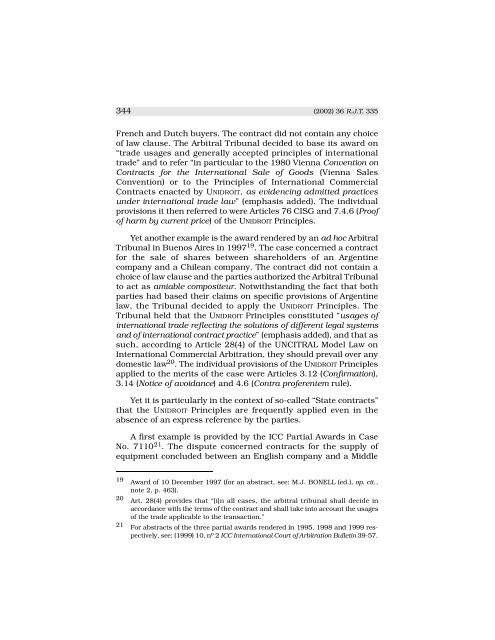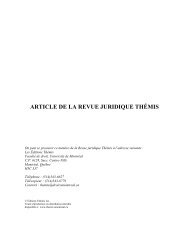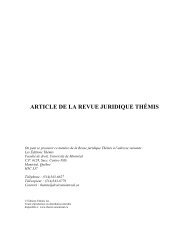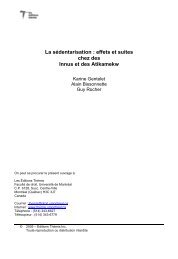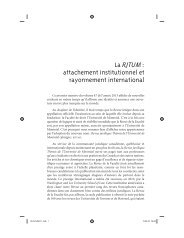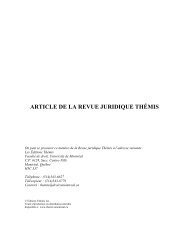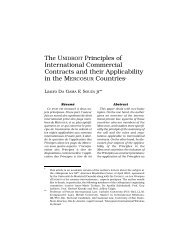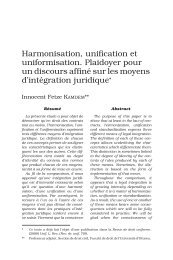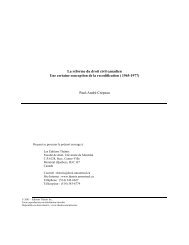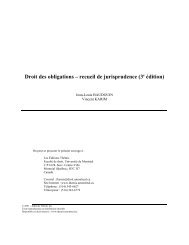The UNIDROIT Principles of International Commercial Contracts and ...
The UNIDROIT Principles of International Commercial Contracts and ...
The UNIDROIT Principles of International Commercial Contracts and ...
Create successful ePaper yourself
Turn your PDF publications into a flip-book with our unique Google optimized e-Paper software.
344 (2002) 36 R.J.T. 335<br />
French <strong>and</strong> Dutch buyers. <strong>The</strong> contract did not contain any choice<br />
<strong>of</strong> law clause. <strong>The</strong> Arbitral Tribunal decided to base its award on<br />
“trade usages <strong>and</strong> generally accepted principles <strong>of</strong> intern a t i o n a l<br />
trade” <strong>and</strong> to refer “in particular to the 1980 Vienna Convention on<br />
<strong>Contracts</strong> for the <strong>International</strong> Sale <strong>of</strong> Goods ( Vienna Sales<br />
Convention) or to the <strong>Principles</strong> <strong>of</strong> <strong>International</strong> Commerc i a l<br />
<strong>Contracts</strong> enacted by UN I D R O I T, as evidencing admitted practices<br />
under international trade law” (emphasis added). <strong>The</strong> individual<br />
provisions it then referred to were Articles 76 CISG <strong>and</strong> 7.4.6 (Pro<strong>of</strong><br />
<strong>of</strong> harm by current price) <strong>of</strong> the <strong>UNIDROIT</strong> <strong>Principles</strong>.<br />
Yet another example is the award re n d e red by an ad hoc A r b i t r a l<br />
Tribunal in Buenos Aires in 1997 19 . <strong>The</strong> case concerned a contract<br />
for the sale <strong>of</strong> shares between shareholders <strong>of</strong> an Arg e n t i n e<br />
company <strong>and</strong> a Chilean company. <strong>The</strong> contract did not contain a<br />
choice <strong>of</strong> law clause <strong>and</strong> the parties authorized the Arbitral Tr i b u n a l<br />
to act as amiable compositeur. Notwithst<strong>and</strong>ing the fact that both<br />
parties had based their claims on specific provisions <strong>of</strong> Arg e n t i n e<br />
law, the Tribunal decided to apply the UN I D R O I T <strong>Principles</strong>. <strong>The</strong><br />
Tribunal held that the UN I D R O I T <strong>Principles</strong> constituted “usages <strong>of</strong><br />
international trade reflecting the solutions <strong>of</strong> different legal systems<br />
<strong>and</strong> <strong>of</strong> international contract practice” (emphasis added), <strong>and</strong> that as<br />
such, according to Article 28(4) <strong>of</strong> the UNCITRAL Model Law on<br />
<strong>International</strong> <strong>Commercial</strong> Arbitration, they should prevail over any<br />
domestic law 20 . <strong>The</strong> individual provisions <strong>of</strong> the <strong>UNIDROIT</strong> <strong>Principles</strong><br />
applied to the merits <strong>of</strong> the case were Articles 3.12 (Confirmation),<br />
3.14 (Notice <strong>of</strong> avoidance) <strong>and</strong> 4.6 (Contra pr<strong>of</strong>erentem rule).<br />
Yet it is particularly in the context <strong>of</strong> so-called “State contracts”<br />
that the UN I D R O I T <strong>Principles</strong> are frequently applied even in the<br />
absence <strong>of</strong> an express reference by the parties.<br />
A first example is provided by the ICC Partial Aw a rds in Case<br />
No. 7110 2 1 . <strong>The</strong> dispute concerned contracts for the supply <strong>of</strong><br />
equipment concluded between an English company <strong>and</strong> a Middle<br />
19 Award <strong>of</strong> 10 December 1997 (for an abstract, see: M.J. BONELL (ed.), op. cit.,<br />
note 2, p. 463).<br />
20 Art. 28(4) provides that “[i]n all cases, the arbitral tribunal shall decide in<br />
a c c o rdance with the terms <strong>of</strong> the contract <strong>and</strong> shall take into account the usages<br />
<strong>of</strong> the trade applicable to the transaction.”<br />
21 For abstracts <strong>of</strong> the three partial awards re n d e red in 1995, 1998 <strong>and</strong> 1999 re s-<br />
pectively, see: (1999) 10, n o 2 ICC <strong>International</strong> Court <strong>of</strong> Arbitration Bulletin 39 - 57 .


